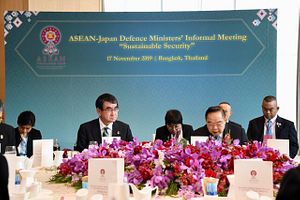One of the significant but under noticed developments at this year’s ASEAN Defense Ministers’ Meeting-related (ADMM) meetings in Bangkok was Japan’s launching of a sequel to its defense initiative for Southeast Asian states, termed Vientiane Vision 2.0. The development once again put the focus on Japan’s rising security role in the Asia-Pacific in general and in Southeast Asia in particular.
Despite restrictions that remain on its defense options, Japan has long played an important if underappreciated role in Asian security, with Tokyo being an integral to trends and developments from the development of regional security architecture to the rise of coast guard forces in Southeast Asia. That has only accelerated under Prime Minister Shinzo Abe amid a series of international and domestic developments, be it the focus on China’s continued assertiveness or the easing of legal restrictions on arms exports in Japan.
One of the manifestations of this was the Vientiane Vision. Launched in 2016, the Vientiane Vision was meant as a pathway for Japan to step up the defense aspect of its relations with ASEAN countries building on its bilateral relationships, which has also since been part of Japan’s own Indo-Pacific approach as well. As I noted previously, that initiative was less about new declarations or initiatives and more about setting out priorities for ASEAN-Japan defense cooperation based on general objectives and priority fields by combining various areas of ongoing collaboration and promoting practical defense cooperation based on the needs of both sides. And manifestations of the Vientiane Vision have included a mix of engagements including capacity-building assistance, seminars, trainings, exercises, and human resource development and academic exchanges.
Last week, we saw another manifestation of Japan’s rising regional security role with the launch of Vientiane Vision 2.0. The initiative was launched during the Japan-ASEAN defense ministers’ informal meeting in Bangkok featuring Japanese Defense Minister Taro Kono and his Southeast Asian counterparts – one of a series of meetings where Southeast Asian countries engage with partner or “Plus” countries within the context of the ADMM meeting umbrella.
Vientiane Vision 2.0 is intended to serve as a follow on to the initial Vientiane Vision. At the meeting, Kono said that the initiative would seek to deepen ASEAN-Japan defense collaboration by enhancing regional security by focusing cooperation on ensuring the rule of law, strengthening maritime security, and contending with non-traditional threats.
Thus far, few specifics have been publicly disclosed about how exactly Vientiane Vision 2.0 will be carried forward, including specific initiatives or funding amounts. While this is not altogether surprising – the Vientiane Vision itself took shape over time as well, and it was partly tied to developments in Tokyo’s bilateral relationships in Southeast Asia as well – a deeper assessment of the initiative and its future prospects will have to await such details. One should also not understate the challenges with respect to implementing it – whether it be securing agreement from a range of Southeast Asian countries for some initiatives or coordinating this with other aspects of Japanese policy.
Nonetheless, initiatives such as Vientiane Vision 2.0 are notable manifestations of the increasingly important role Japan continues to play in the Asian security landscape. While some of this may take shape under the radar of the international headlines focused more on U.S.-China dynamics or the economic or diplomatic aspects of Japan’s regional role, one should not lose sight of these developments and their wider significance.
































